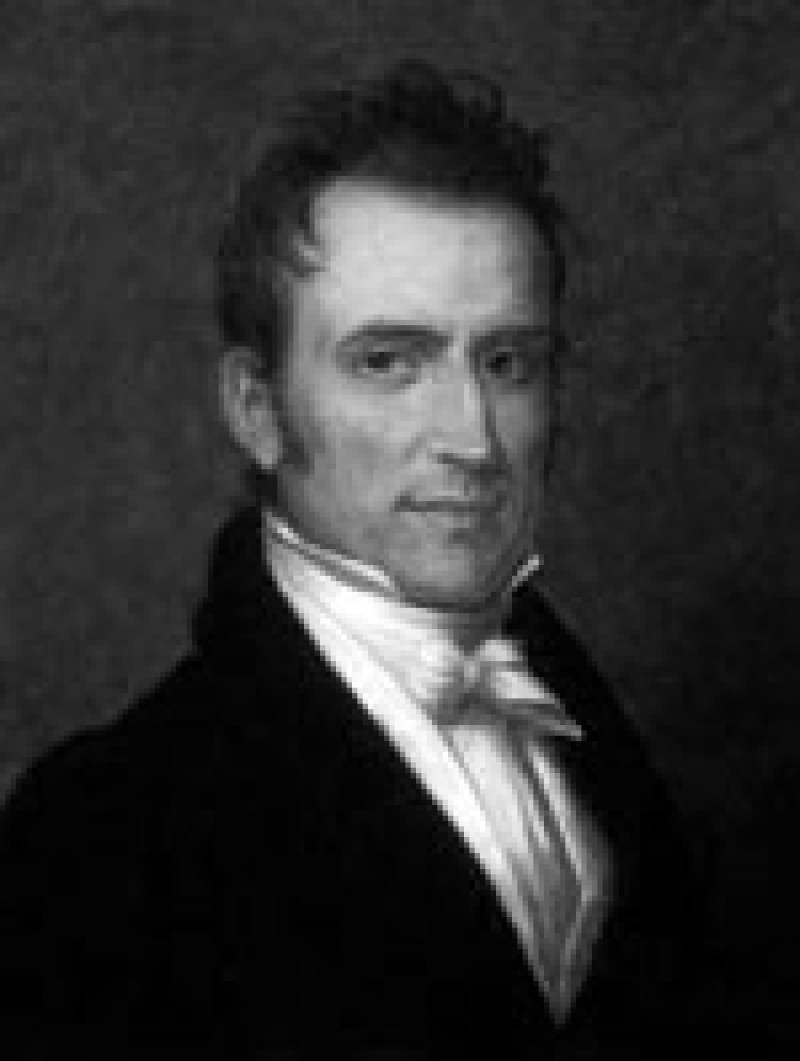John McLean (March 3, 1785 - April 3, 1861)
John McLean, associate justice of the U. S. Supreme Court, was born in Morris County, New Jersey. He moved with his family to Morgantown, Virginia (now in West Virginia ), in 1789, to Kentucky in 1790, and to Ohio in 1796. He worked on his parents' farm until he was 16. At that age he received his first formal education in a local school, where he studied classics for two years.
In 1804 McLean was apprenticed to the clerk of the Court of Common Pleas of Hamilton County. During that time he studied law under Arthur St. Clair Jr., one of Ohio's leading lawyers. McLean was admitted to the bar in 1807.
Shortly after marriage, McLean moved to Lebanon where he published the Western Star, which supported the administration of Thomas Jefferson. He also practiced law for four or five years. He served as examiner of the U. S. Congressional Land Office in Cincinnati (1811-1812). In 1812 the Ohio congressional delegation was increased from one to six, and McLean was elected to one of the new seats. He served in Congress until 1816, when the Ohio legislature elected him to the Supreme Court of Ohio, where he served from 1816 to 1822.
McLean was appointed an associate justice of the U.S. Supreme Court by President Jackson in 1829. At that time each justice rode a circuit where he held trial court proceedings with a district judge. Throughout his tenure McLean's workload as a circuit justice was heavy. In 1838 he traveled 2,500 miles, more than all but two other justices of the court.
As an associate justice, McLean authored 160 majority opinions and 30 dissents. He was one of the few justices who published his circuit opinions. McLean wrote of number of antislavery opinions, including one as an Ohio Supreme Court justice in Ohio v. Thomas D. Carneal (1817), limiting the ability of slaveholders to take slaves into free states. In 1848 he publicly stated that to exist, slavery needed positive law, and that consequently — unless authorized by Congress ? slavery could not exist in a territory.
McLean was frequently considered as a presidential candidate. He was endorsed by the Ohio legislature as a candidate for president in 1836. He unsuccessfully sought the 1848 Whig nomination and was discussed as a possible Free Soil candidate that same year. He received 196 votes in a straw poll at the 1856 Republican Convention and 12 votes on the first ballot at the Republican Convention in 1860. His presidential ambitions were heightened, in part, by the low opinion he had of almost every other presidential candidate.
McLean was in good health until the last two years of his life, when illness sometimes kept him from the bench in both his circuit and on the Supreme Court. He died in Cincinnati. McLean was considered an able man, but not one who towered above his contemporaries. Francis Phelps Weisenburger noted in his book The Life of John McLean that while McLean spent most of his public life on the bench, he ?was a politician before he became a jurist, and he remained a politician to the end.
Some content and graphic elements featured on webpages related to the Thomas J. Moyer Ohio Judicial Center were used with the permission of the Ohio Historical Society; the Prints and Photographs Division of the Library of Congress; the Office of the Curator of the Supreme Court of the United States and American National Biography Online.
Biography of John McLean (March 3, 1785 - April 3, 1861)
Citation: Richard L. Aynes. "McLean, John"; http://www.anb.org/articles/11/11-00580.html; American National Biography Online Feb. 2000. Access Date: Fri Oct 3 09:58:22 2003. Copyright © 2000 American Council of Learned Societies. Published by Oxford Univeristy Press. All Rights Reserved.
Portrait of John McLean - Office of the Curator, Supreme Court of the United States.

